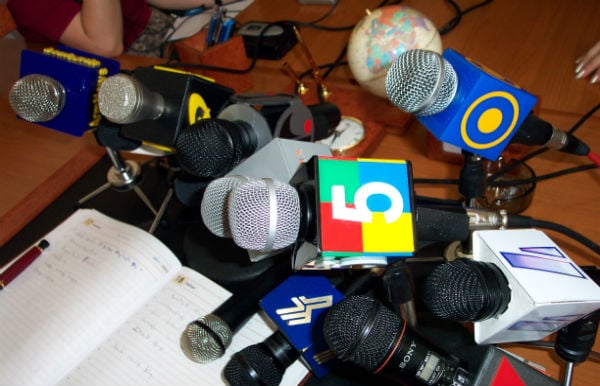The well-known (Russian) saying “It is the feet that feed journalists” (that is, running after stories is what puts food on the table for journalists) is quite timely. Often we become witness to a spectacle whereby distressful reporters in Armenia’s media industry dash from one press conference to another, then in frank conversations later, tell each other that this process is a boring occupation.
There are cases in which a reporter, hastily arriving at some politician’s press conference, doesn’t even manage to find out his name beforehand, being forced to whisper to the colleague sitting beside her “Who is this?” Then at that same press conference, she gives her usual question, which she asked in the morning to some Member of Parliament who she no longer remembers.
The “Running Feet,” who are mainly women, make up a dominant part of Armenia’s news industry. Though it should be stated that in our work, gender and sexual orientation have no significance whatsoever — the important thing is that the head that’s guiding the feet works well.
When such a reporter, conducting her “difficult” work, returns to the office, and is asked by her editor “What was interesting?” almost always answers “Nothing. There was nothing interesting, just the usual press conference.”
But if this representative of the media front was properly prepared for the occasion it wouldn’t have been a usual press conference; moreover, she could have returned from the event with good material, even becoming the author of a sensation. The nail on the head of the press conference could’ve been the answer to her well-placed question. However, to give good questions, one must undertake serious preparations.
Let’s not get ahead: let’s go over everything in order. So, an editor informs a reporter that tomorrow she has to go to some well-known person’s press conference. What primary actions must she take? Well naturally, first she must check the condition of her audio recorder and change the batteries if necessary. She must take a pen and notebook with her to the press conference, since in any case, you can’t rely completely on technology.
It’s also necessary to go to the venue a little early, to get a seat near the front. This way it’s more likely to be one of the first to ask questions, since the moderator might limit the number of questions. Women shouldn’t shock the moderator with their short skirts, especially if they intend to sit in the front. After all, the politician too (if he is a member of the male sex) is a man.
How to prepare a good question is a different issue altogether. First, prior to coming to the press conference, it’s important to research the biography of the person giving the press conference and to become familiar with statements he’s made in the past. Political figures fear — while at the same time respect — well-informed reporters.
Let me cite one vivid example, as to how a well-placed question allowed me to interview one of the most influential people in the world at the time.
In the late 90s, NATO Secretary General at the time Javier Solana came to Armenia. Going to his press conference, I prepared a question tied to NATO’s expansion to the East which was a very current issue at the time. When I asked the question (I was a reporter with Interfax news agency at the time), Solana got red, began to justify the organization, saying NATO has never pursued political goals in expanding to eastern countries (of course time proved otherwise) and doesn’t oblige anyone to join the organization — the North Atlantic Treaty Organization simply helps some countries in the region take care of their security.
It seems I had “struck” his weak points. The NATO Secretary General’s response lasted about 10–15 minutes. But Solana didn’t stop there: after the press conference, his assistant approached me, asking me to go up to the third floor of the building (it was the Armenian Government Guest House) as Solana wanted to meet with me privately.
The extent of my surprise was immense. In my long-standing journalistic practice this was the first time that something like this had happened. When, guided by the assistant, I entered the room on the third floor, the omnipotent NATO Secretary General was already waiting for me.
He was already sitting on the sofa and there was tray full of fruit on the table. Nevertheless, he did not intend to focus on hospitality and immediately got down to business. “I have invited you [here] to give you a private interview,” he began. After a certain pause, he asked unexpectedly, “Are you Russian by ethnicity?” Receiving a negative response, he gave instructions to quickly procure the services of a translator since he would like to express his position regarding the question I posed at the press conference and if necessary, to respond to my questions.
When I handed in the final article to the editors at Interfax, the first deputy chairperson of our agency immediately called me to find out how I was able to secure an exclusive interview with the NATO Secretary General.
There have been several other press conferences as well where I tried to ask piercing questions of the speaker. The important thing is I’ve never considered that press conferences are simply places to waste time — its just that you have to always have a well-placed and pressing question in your arsenal.
Tigran Hovhannisyan






